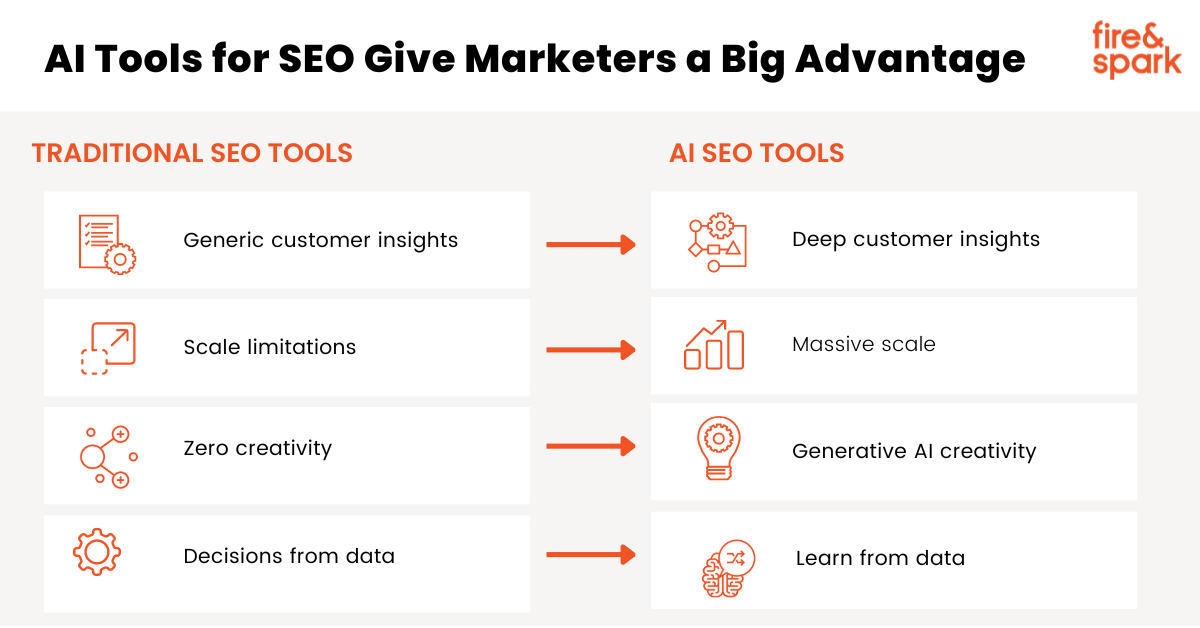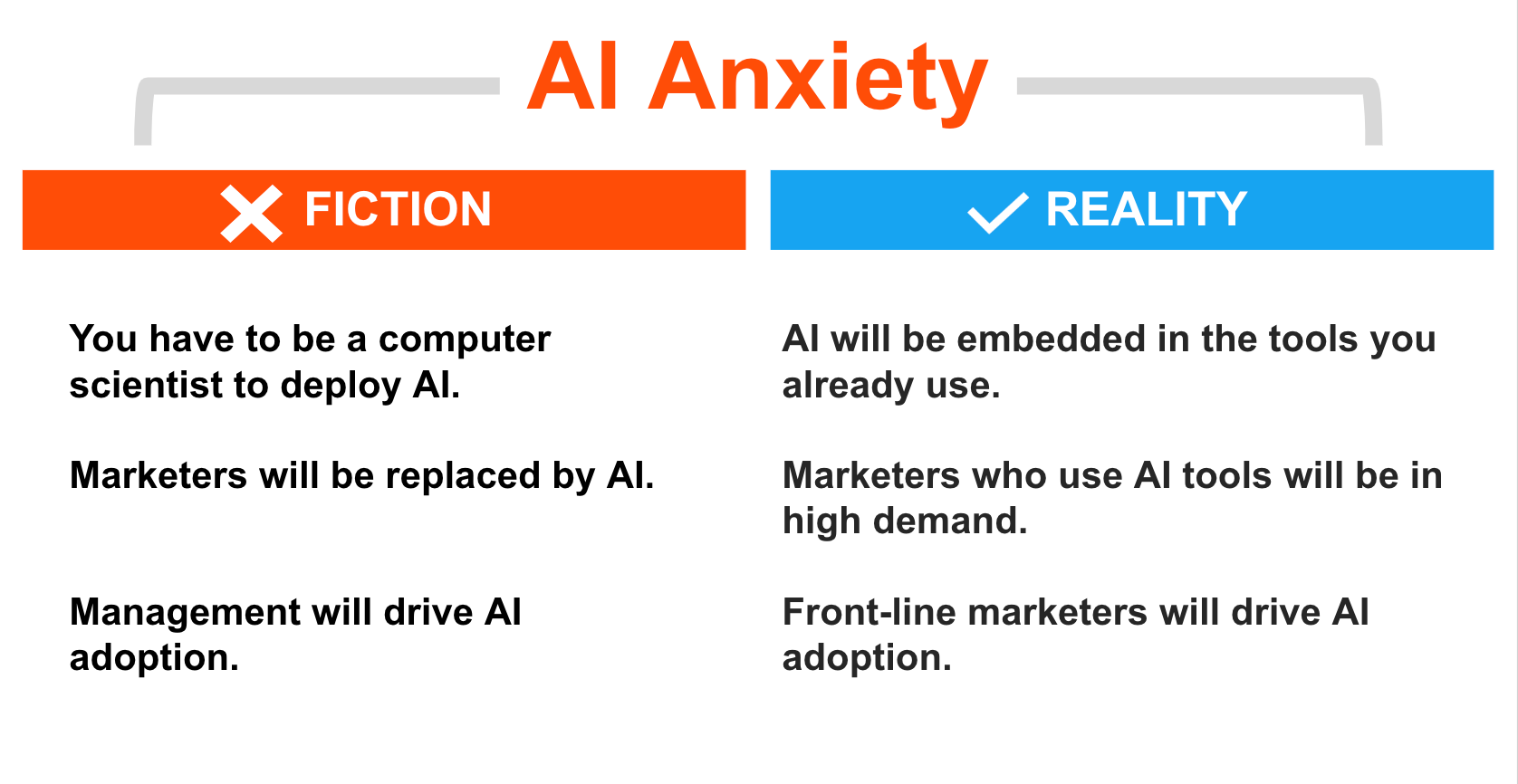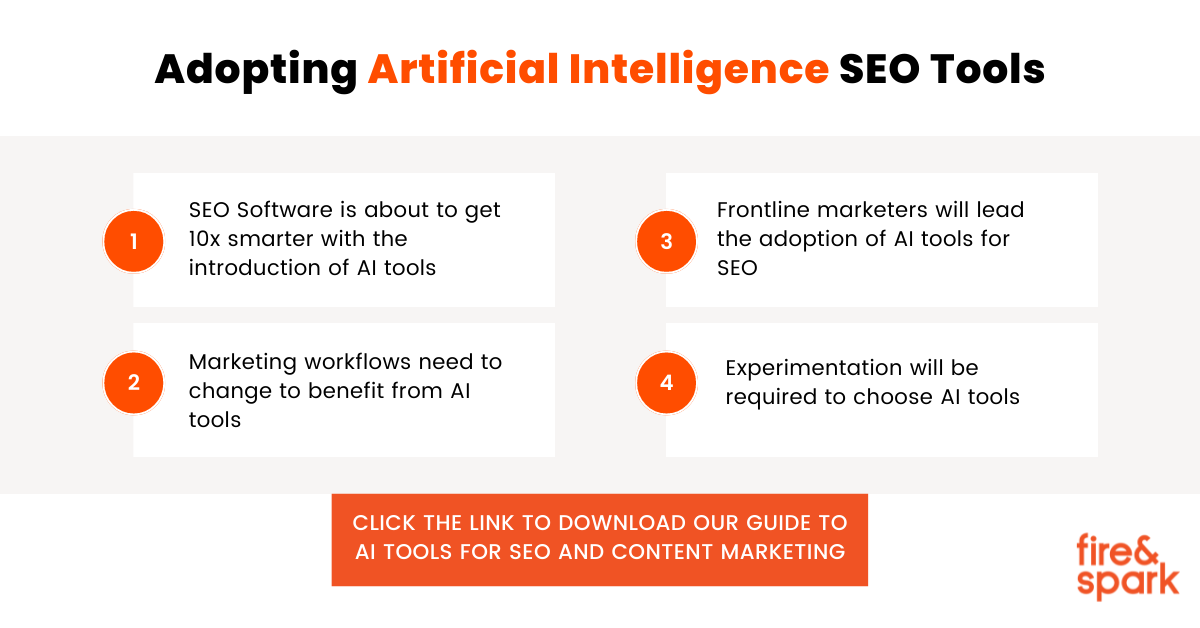When we think about applying AI to marketing, we often think about automation. Automation can be helpful for tasks like sending an email or scheduling social media posts. But, modern AI has the potential to change the way marketers work in ways that are much more impactful than just automation.
AI is all about making marketing software smarter. It’s important to realize that you don’t need to understand the intricacies of algorithms; you just have to understand that much more intelligent marketing software is coming.
What is AI good at?
AI is good at prediction, data-driven tasks, and massive scaling.
Prediction
AI is good at predicting consumer buying habits based on their previous shopping behavior.
Imagine products you would feature in a newsletter you send to one of your customers like John Doe. Those products would be different from those you would want to feature in the same newsletter to another customer, e.g. Jane Smith.
What the AI is doing is predicting what John Doe might want to buy based on all the data and history that it has for John Doe. Then, it’s separately predicting what Jane Smith would buy, based on Jane Smith’s history.
Data-Driven Tasks
AI is good at completing data-driven tasks, especially at a higher scale than a human would be able to.
For example, a data-driven task might be suggesting new products to a greeting card company. If you’re running a greeting card company, some of the data you might have is keywords that are driving traffic to your website. So, what are your customers searching for? Based on that, the AI can take a look at all that massive stream of data that’s coming in and suggest ideas for greeting cards or products that don’t already exist on your website. When humans try to scale a task like this they’re dealing with a lot of data. This is why the AI can do it better.
Massive Scaling
When you’re a large brand with thousands of online mentions across social media, your website, and Google reviews – you want to be able to showcase that. But, it’s difficult to summarize all these customer sentiments about your products and brand. In a case like this, AI can take images like a real-time NPS score scraped off the web. And, AI is good at doing it at scale.
Remember, there are billions of pages on the web. Marketing AI learns to make better predictions from the data it has access to. It can use your customer data, customer profiles, customer behavior on your website, and any other data you have or can get.
How will Marketers use AI?
Here are 6 ways marketers will use AI within the coming years:
- AI will be embedded in tools you already use
This is already happening in many cases. Try searching up one of the softwares you use on a day-to-day basis and see if AI is already embedded in it.
There are also dedicated AI tools. For example, a tool that does keyword research for you or is smarter at doing keyword research than the SEO tools you have access to today.

- User-friendly AI builders
Engineers are currently working on user-friendly AI builders. If you previously wanted to code AI you’d have to understand some computer science in order to do it. But, now some platforms are in development that will enable marketers to build AI systems – without needing to understand computer science.
- Service APIs
Some APIs allow you to code against them. Companies like Amazon, Microsoft, and Google have APIs like this.
- Stealth AI
Stealth AI are the services you already use that you don’t even know about. They are similar to the AI that’s embedded in the software you are already using.
- Mass Personalization
Mass personalization is an incredibly fascinating use case. Most practices that we are all using are about to become obsolete; they’re already outdated.
In this example, we’ll discuss AI mass personalization in relation to email marketing.
Segmentation, for example, made sense when it came to segmenting your email list to send the right emails to the right people based on what they previously bought, demographics, or whatever other data you have about these contacts. Well, that’s the old way to do it. It made sense and it worked, which is why we all did it, but what about applying AI to emails?
If you were to use an AI solution to send your emails, the way it would work is the AI solution would analyze all of your customers’ profiles. For example, what the customer purchased in the past.
The AI can get pretty smart pretty quick by using all of the data that is going through its system. So, the AI is putting all of that data together to generate a customized email. The email might say something like “thank you for your purchase last year” or “I saw you haven’t been on the site very often”.
These AI-generated emails are so incredible because they look like they were written by a human who understands your preferences, purchase history, behavior on the website, etc.
Machine learning will be used to personalize emails. AI not only learns your customers, but also other consumers and competitors who are also using the tool. AI can adapt and take into account a massive number of datasets or data points when it’s writing content, like these emails.
- Landing Page Optimization
One tactic that marketers are still using is old school A/B testing. A/B testing is a way to create two different versions of a landing page where you’re making a minor change because you want to know if that change makes the landing page better or worse in terms of its conversion rate. Well, A/B testing is a tactic that is about to become obsolete.
If we use AI to conduct a similar strategy, we would expect the AI to choose a landing page variation based on its understanding of the data it has access to (i.e other landing pages it’s created and how well those worked).
We can also imagine an AI that generates a custom landing page for the individual that just clicked on it based on the ad creative they saw or what they typed into Google.
In time, AI optimization will work better than A/B testing.
What does AI mean for Marketers?
It’s important to become an AI-enabled marketer. If you understand AI tools then you’ll be the person in your organization who’s investigating them, learning and inventing new workflows, and essentially becoming much more valuable to your organization. This is a big opportunity – a once in a career opportunity for marketers.
There are some marketers that are going to embrace the technology and experiment with all the different tools. But, there are also other marketers who are just going to ignore it; these marketers will be less and less valuable over time.
The good news is that to become an AI-enabled marketer you don’t need to understand the gory details of AI technology. Think about your car, for example. You don’t know everything about how your car works, but you know that your car is good at doing some things (i.e getting you to work). You also know that your car is bad at some things (i.e getting you from New York to London); you would use a different tool for that situation. The reason why we use this analogy is because it’s the same thing for AI where it’s important to understand what types of problems AI can – and can’t – solve.
AI Anxiety
A lot of marketers wonder if AI is going to take their job – the short answer is no! Here’s the reality of dealing with AI anxiety:

Takeaways
As a digital marketer, the time to learn and implement AI is now! Marketers who put in the effort to understand how AI works and how to use it effectively for their organization will lead the adoption of AI tools across the industry.


